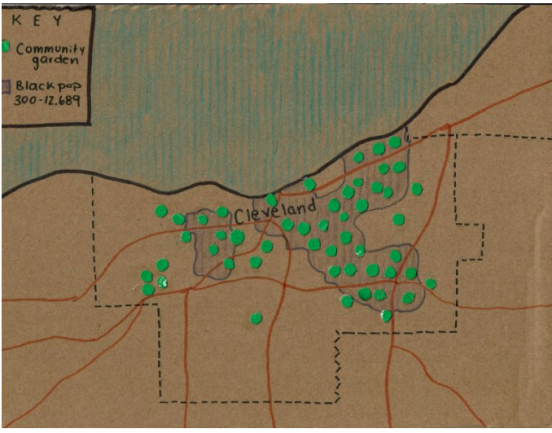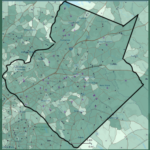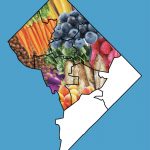This project examines the connection between historical housing discrimination practices and community gardening in Cleveland, Ohio. A majority of community gardens within Cleveland exist on the east side of the city, the same area of the city that was considered undesirable for investors by Homeowners’ Loan Corporation (HOLC). The east side also houses the largest percentage of the Black population in Cleveland and was an area where Black people could purchase or rent and occupy property without problem. 
HOLC’s discriminatory housing practices allowed for this area of the city to receive limited investment and has led Black citizens of Cleveland to have a disproportionate exposure to environmental bads, including poverty and hunger.
Community gardens come as a direct response to this disproportionate exposure. Many community gardens are grown on vacant land caused by discriminatory housing practices; this allows citizens to resist these policies and the environmental bads they cause.
They provide a space to grow fresh fruit and vegetables, allowing citizens to have access to healthy options they would not have access to otherwise. It also fosters self-sufficiency and agency; gardeners are able to plan, maintain and harvest their own plot to provide food for themselves and their family. They are no longer relying on produce from the grocery store or food bank. Furthermore, community gardens provide space to create connections within a neighborhood and allow for networking, resource-sharing and trust building. Community gardens are a just sustainability because they ensure hunger needs are being met without supporting systems that degrade the environment.
-Emily P.






parsonsa
May 1, 2020 — 5:31 pm
Since I also did gardens, it was interesting to see how we reached the same conclusion in different places. I especially found it interesting that gardens in Cleveland serve as a way to combat gentrification! Great job on your visual and overall project!
ketchumt
May 1, 2020 — 5:42 pm
Reading this I found it super interesting just how much of an impact community gardens can have on certain areas. I feel like many people view community gardens as a fun project that some areas do but in some cases, it can have a much greater impact than just something ‘fun’ in the community.
bromleyd
May 1, 2020 — 5:58 pm
I think community gardens are so great because no matter where they are there tends to be such a great community pay off. When we visited the community garden in Carlisle it was so amazing to see how the park had been cleaned up as well and how many more people came to garden or just be outside. Your visual is really great, and I am glad that these areas see so much benefit from all of the community gardens!
Hiba
May 1, 2020 — 6:05 pm
Loved seeing you explore this topic and finding out how community gardens in Cleveland translate as a form of resistance to discriminatory housing practices affecting its African American population.
palaciom
May 1, 2020 — 6:08 pm
I really enjoyed that community gardens serve a purpose in unifying people which is something I had not thought of before! I really enjoyed your visual as it is clear where the gardens are in Cleveland.